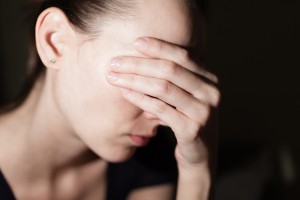4 Key Factors Why Women Experience Depression More than Men

Women are twice as likely to experience depression than men
According to the Mayo Clinic, about 1 in 5 women develop depression at some point in life. Statistically, women are nearly twice as likely to develop the disorder then men, and, while depression can happen at any time during a woman’s life, it is more common between the ages of 40 and 59. Normal hormonal changes are responsible for some level of depression in those who suffer from it, but these normal fluctuations are not the only reason for increased levels of the disorder in women. The following four factors explain why women are more susceptible to this mental illness than men:
Brain Chemistry and Hormones
People who suffer from depression have different brain chemistry than those who do not. A woman’s brain chemistry is also impacted by regular hormonal fluctuations, especially during certain times in a life, like after childbirth or during menopause. The hormonal fluctuations can be so severe during these times that medication is sometimes necessary to normalize brain chemistry and protect against severe depression.
Puberty
When a girl begins puberty, hormonal changes and changes in her body often bring on depression. Body image, peer pressure and a young girl’s general sense of self-esteem can also play a role in whether or not she will develop depression during this time of great change. A teen girl’s general attitude about puberty and the journey to womanhood can also affect how she feels about herself, and these changes can increase or decrease her risk of depression. As this is a time of great change, depression can often result.
Stress
When a woman’s stress level is high, her risk of depression is also increased. Although stress is common enough in society, women are particularly susceptible to its effects due in part to the other factors previously mentioned. When stress comes from so many demands on a woman’s time from so many places, it can result in extreme fatigue, which makes it easier to slip into depression. Increases in stress over long periods of time can dramatically increase a woman’s risk of depression, including severe (clinical) depression that requires medication, therapy and sometimes hospitalization.
Menstrual Problems
Along with puberty, pregnancy and menopause, many women suffer from menstrual problems. Menstrual issues can begin with puberty and continue throughout a woman’s life until menopause. Heavy bleeding with each period, fibroid tumors, endometriosis and missing periods can cause extreme fatigue, mood swings and a general sense of despair that leads to depression. With the right medical intervention, women with menstrual issues can lead normal, healthy lives. But getting the right diagnosis and treatment can take time, increasing the risk of a woman developing depression.
Symptoms of Depression in Women
Depression can be severe and debilitating for women, but, with the right treatment, women who suffer from it can find relief and hope. If you or a loved one suffers from chronic feelings of sadness and you think depression may be the culprit, then know that there are symptoms to look for; the Mayo Clinic lists the following signs and symptoms of depression:
- Ongoing feelings of sadness, hopelessness and guilt
- Loss of interest in things you once enjoyed
- Significant changes in sleep patterns, such as insomnia or sleeping too much
- Fatigue or other physical symptoms, like pain, with no apparent cause
- Changes in appetite that lead to significant weight gain or loss
- Feeling as though life is not worth living or having thoughts of suicide
Even one of these symptoms is abnormal and can be a sign that help is needed.
Treatment for Depression
The first step in getting help for depression is visiting a doctor for an appropriate diagnosis. Your doctor will want to rule out any physical problems that may be causing your symptoms, and she may want to provide proper treatment if possible. From there, a visit to a mental health professional can get you started on the path to recovery. With a combination of medication, psychotherapy and positive lifestyle changes, you will begin to see relief right away. Getting the perfect balance of these treatment tools may take a little time, but patience during the process can help lift your mood so you can see light at the end of the tunnel.
If you also struggle with addiction to drugs and alcohol, your treatment professionals can help you find Dual Diagnosis treatment. Dual Diagnosis facilities simultaneously treat both disorders, which greatly increases the chances of recovery from both depression and addiction.
Find Help for Depression
Depression is a mental illness that can cause extreme feelings of sadness and even thoughts of suicide. Getting appropriate treatment for depression can help you lead a normal and happy life. If you or a loved one struggles with depression, then know that we are here for you. Call our toll-free, 24 hour helpline to speak to an admissions coordinator for available treatment options. You can recover with the right help, so seek it today.

 We take your privacy seriously. To help ease any concerns and uncertainty about calling for drug and trauma abuse help
We take your privacy seriously. To help ease any concerns and uncertainty about calling for drug and trauma abuse help